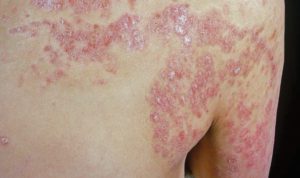By Anne Marie Tremaine, MD
 Psoriasis is a chronic, immune-mediated condition that affects 7.5 million Americans. There is no cure for this condition, thus long-term management by your dermatologist is necessary. Psoriasis causes red, raised, scaly patches to appear on the skin and any portion of the skin can be involved, however, the elbows, knees, scalp, nails, palms and soles are most commonly affected.
Psoriasis is a chronic, immune-mediated condition that affects 7.5 million Americans. There is no cure for this condition, thus long-term management by your dermatologist is necessary. Psoriasis causes red, raised, scaly patches to appear on the skin and any portion of the skin can be involved, however, the elbows, knees, scalp, nails, palms and soles are most commonly affected.
Psoriasis is partially hereditary, but it is also impacted by environmental factors. Psoriasis can start or flare with exposure to trauma, surgery, certain medications, infections, and stress. Onset can be at any age, however, there appears to be a major peak at 20 – 30 years of age, and then again at 50 – 60 years.
Twenty to thirty percent of patients with psoriasis will also have psoriatic arthritis, which is a destructive arthritis that needs aggressive treatment to prevent permanent damage to the joints.
While there is no cure for psoriasis, we do have many treatment options and many of them are new within the last 15 years. Treatment options include topical creams (steroids, vitamin D analogues, coal tar), light therapy, oral medications (apremilast, acitretin, methothrexate), and targeted immune modifiers (injectable biologics). The biologics have really been a game changer for psoriasis and psoriatic arthritis in terms of efficacy and ease of treatment. There are several different commercially available biologics that target various parts of the inflammatory process of psoriasis. Each treatment carries a different side effect profile and the appropriate treatment will be patient dependent.
It is important to understand that psoriasis is not just a disease of the skin, it can have profound systemic implications and is associated with cardiovascular disease and metabolic syndrome. Patients with psoriasis can have increased risk of high blood pressure, heart attack, and stroke. Obesity, increased alcohol consumption and smoking have all been associated with worsening of psoriasis, and an important part of psoriasis treatment is living a healthy life style and treatment of comorbidities that develop.
In addition, psoriasis can have a significant negative impact on quality of life. Nearly 60% of people with psoriasis report the disease affects their life daily. Psoriasis can have a negative effect on relationships, obtaining and maintaining employment. Patients with psoriasis are more likely to become depressed. For all of these reasons, it is extremely important for psoriasis patients to advocate for themselves. The National Psoriasis Foundation (https://www.psoriasis.org/talk-psoriasis) has a wealth of information about the disease, treatment options, access to support groups and much more.
August is psoriasis awareness month and the National Psoriasis Foundation is focusing on a campaign that aims to raise awareness for this condition and empower patients with psoriasis to take control of their health.
Anne Marie Tremaine, MD
Board Certified Dermatolgist
Harvard Cosmetic and Laser Medicine Fellowship
Dr. Tremaine is a board-certified dermatologist with fellowship training at Harvard Medical School in laser and cosmetic surgery. She has contributed as a dermatology expert for online and print magazines including Family Fun, msn.com, menshealth.com, and ccn.com. In addition, she frequently lectures to
professional societies on her diverse research.
For more information about skin care visit the Skin Wellness Physicians website at: www.skinwellnessflorida.com









